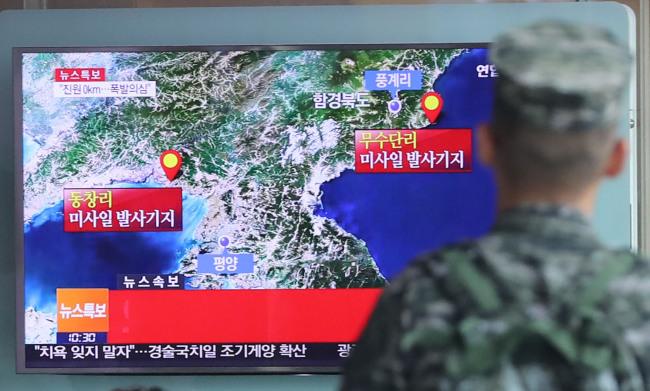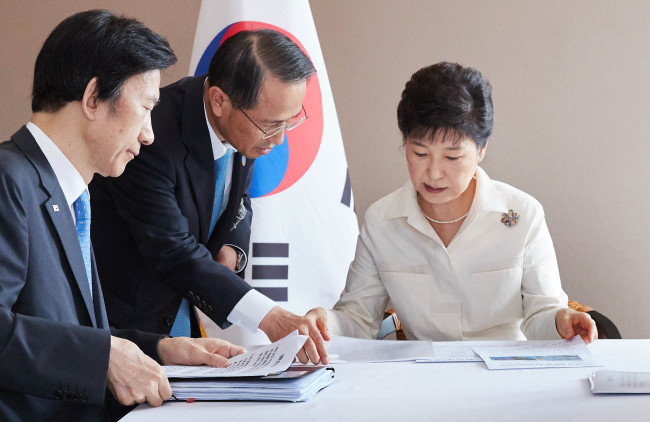‘NK conducts largest nuclear test’
President Park cuts trip short, talks on phone with Obama
By Yoon Min-sikPublished : Sept. 9, 2016 - 13:39
North Korea is believed to have carried out Friday another nuclear test assessed to be its largest one to date, South Korean military said. This marked the fifth official nuclear experiment by the communist state since the UN Security Council adopted a resolution banning it from any nuclear or ballistic missile programs.
The Joint Chiefs of Staff said that a magnitude-5.0 artificial earthquake had been detected near Punggye-ri, Hamgyeong Province, where an underground nuclear test site is located. The waves had been reported by the state-run Korea Meteorological Administration.
The Joint Chiefs of Staff said that a magnitude-5.0 artificial earthquake had been detected near Punggye-ri, Hamgyeong Province, where an underground nuclear test site is located. The waves had been reported by the state-run Korea Meteorological Administration.

“(The military) believes that it is a nuclear test, and we are conducting further analysis on the nuclear material used and whether the test has succeeded,” Defense Ministry spokesman Moon Sang-kyun said in a press briefing.
Based on the size of the seismic event, the KMA estimated the yield of the test to be about 10-12 kilotons, which amounts to 67-80 percent of that of the atomic bomb that hit Hiroshima in 1945.
Pyongyang’s fourth and latest nuclear test in January, which caused a magnitude-4.8 earthquake, was assessed to involve 6 kilotons.
No further signs of unusual movement were detected from the North Korean military afterwards, according to military.
North Korea, which remained silent in the hours following the explosion, later confirmed the observations.
“Our nuclear scientists and technicians have carried out a nuclear explosion to check the capacity of a new nuclear warhead,” the North’s official channel Korean Central TV said at around 1:30 p.m.
“It has been confirmed that the test neither caused radiation leaks, nor exerted any negative influence on the surrounding natural environment.”
Pyongyang‘s state nuclear institute also claimed to have succeeded in miniaturizing the nuclear warheads, a phase deemed critical to mounting the warhead onto a ballistic missile.
In light of the circumstances, Cheong Wa Dae said President Park Geun-hye will return earlier than expected from Vientiane, Laos, where she rounded off an eight-day overseas trip encompassing a series of multilateral and bilateral summits.
“(The test) is proof of the frantic recklessness of the nuclear-obsessed Kim Jong-un administration,” the president said in an emergency meeting in Laos. Attending the meeting were Foreign Minister Yun Byung-se, Trade Minister Joo Hyung-hwan and chief senior presidential secretaries.
“The North’s nuclear test will only result in strengthened sanctions and isolation from the international society and its provocations will lead to self-destruction,” the president added, vowing all measures to curb the communist neighbor’s nuclear ambitions.
The South Korean president also talked over the phone with her US counterpart Barack Obama. The two had met Tuesday in Hangzhou, China, on the sidelines of the Group of 20 summit, and reached a consensus on enforcing sanctions against North Korea.
“President Obama said that the US will take all measures based on the mutual defense treaty, including the nuclear umbrella, to protect South Korea from the North’s provocative threats,” the Blue House said in reference to the presidents’ phone conversation.

According to an official from the Foreign Affairs Ministry, Minister Yun Byung-se held phone conversations with his US and Japanese counterparts John Kerry and Fumio Kishida and agreed on additional sanctions on the North.
This will likely involve closing the current loopholes in the sanctions based on the UNSC resolution 2270, as well as the independent sanctions by each countries.
While the state leader set to returning back home, Prime Minister Hwang Kyo-ahn presided over a National Security Council meeting and Defense Minister Han Min-koo attended a parliamentary defense committee meeting in the afternoon.
“The government sternly urges that North Korea immediately scrap its nuclear and missile programs in a complete, testable and irreversible way,” NSC Secretary-General Cho Tae-yong said through an official statement speaking for the government.
Friday also marked the 68th anniversary of the North’s government foundation day, around which observers and officials here had been anticipating an armed protest near Pyongyang to commemorate the occasion.
The Defense Ministry spokesperson, however, said it is too early to definitively determine the North’s intention behind the test and the type of explosive device used.
Under orders from its leader Kim Jong-un, North Korea has been seeking to advance its nuclear and missile programs. It has seen advances particularly in ballistic missile technologies, conducting its first successful launches of the intermediate-range Musudan and submarine-launched KN-11 missiles this year.
While the hermit kingdom declared it had used a hydrogen bomb in the January test, it was widely assessed by experts such as IHS Jane’s to be a boosted fission weapon. The test, along with the long-range ballistic rocket launch in February, prompted the UNSC to pass resolution 2270 which encompasses the most powerful economic sanctions against Pyongyang to date.
Earlier in the day, the European Mediterranean Seismological Center announced that a magnitude 5.3 earthquake was detected at the China-North Korea border region at around 9:30 a.m., at a depth of zero kilometers.
At the parliamentary committee for national defense, Defense Minister Han said that South Korea and the US are cooperating to keep a close eye on North Korea’s movement, while stepping up vigilance against possible additional provocations.
The National Intelligence Service Director Lee Byung-ho, however, explained that the North‘s miniaturization of its nuclear warheads is progressing at a faster rate than previously anticipated. He added that the device used in Friday’s test was assessed to be not a hydrogen bomb and ”does not appear to be a failure.“
Japanese Prime Minister Shinzo Abe held a National Security Council meeting, and reportedly said the North Korea’s nuclear test “is intolerable.” He vowed to work with Seoul and Washington to respond to Pyongyang’s nuclear and missile programs.
By Yoon Min-sik (minsikyoon@heraldcorp.com)








![[Today’s K-pop] BTS pop-up event to come to Seoul](http://res.heraldm.com/phpwas/restmb_idxmake.php?idx=644&simg=/content/image/2024/04/17/20240417050734_0.jpg&u=)
![[Graphic News] More Koreans say they plan long-distance trips this year](http://res.heraldm.com/phpwas/restmb_idxmake.php?idx=644&simg=/content/image/2024/04/17/20240417050828_0.gif&u=)







![[KH Explains] Hyundai's full hybrid edge to pay off amid slow transition to pure EVs](http://res.heraldm.com/phpwas/restmb_idxmake.php?idx=652&simg=/content/image/2024/04/18/20240418050645_0.jpg&u=20240419100350)

